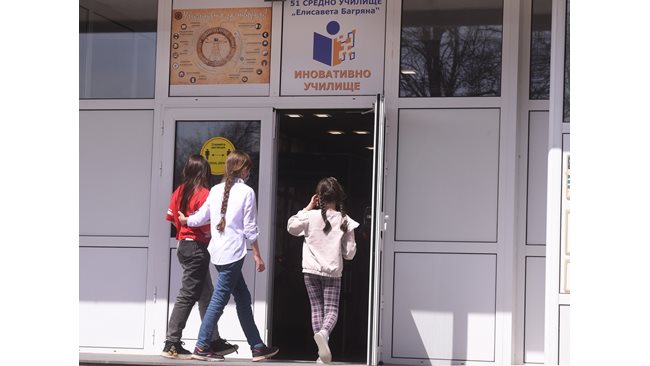- Primary pedagogues and teachers of children’s literature – a clumsy exam prepared by people who do not know how to ask questions
- And the proud peacock, who appeared in the seventh task of the test, provoked controversy whether he was arrogant or a fucker
Otherwise, the tragic news that 88% of fourth-graders in Bulgaria can not explain the meaning of the word “firefighter” lit a fire first in the media, and for hours grew into public debates on social networks.
Not only parents but also educators opposed the conclusions in the analysis of the Ministry of Education.
In one of the test tasks, students had to read a short text entitled “Fire – a friend and foe of man” and answer a few questions.
The last sentence of the text reads: “In case of fire, you must quickly call the emergency number 112 for firefighters to come.” One of the questions is to explain the meaning of the word “firefighter”.
According to the dictionary:
Firefighter – a person whose profession is to put out fires.
Firefighter – a person with a profession to put out fires.
“Here
there are nuances in what
expected of children
They replied that the firefighter was putting out the fire. The full answer, however, is that he is a man whose profession is to put out fires. Not everyone who does it is a firefighter, but someone whose job it is. Children are required to understand in depth what they are reading. The test is well balanced. This is the goal and in my opinion the experts have done a good job “, the Minister of Education, Academician Nikolay Denkov, is convinced.
However, the teacher of Bulgarian language and literature at the 119th high school in Sofia “Acad. Mikhail Arnaudov ”Tsetsa Petrova. “The questions that are the subject of public analysis, conclusions and conclusions are incorrect and the exam was taken carelessly. Not children do not know how to answer, and those who ask do not know how to do it. They do not know the curriculum in detail, but take the exam. The exam does not check what the curricula in Bulgarian language and literature from 1st to 4th grade require as basic knowledge and skills. The exam itself looks like a game of a blind grandmother – touched here and there, and in the end – nothing “, Ms. Petrova is convinced.
According to her, the question about the firefighter is incorrect. “In 5th grade we teach them that the word has grammatical and lexical meaning. Firefighter is a noun, and maybe needs to be explained
the meaning according to the dictionary –
something that is learned only in the 5th grade “,
the writer is categorical.
According to the primary school teacher Rositsa Hristova from Yambol, the students answered the question correctly. A mature person would say the same, she said.
“Until the 4th grade, children think visually. They first imagine the image and then answer the question, “says Hristova. “The Ministry of Education obviously does not know what the mental activity of the students is,” the teacher said.
Comments were provoked by the seventh task of the test, because of which the ministry said that many students do not recognize the meaning of words such as “arrogant”, “arrogant”, “shy”, “shy”, “proud”. The question is as follows:
In which order are all the words antonyms of the underlined word in the sentence?
The proud peacock carries a fan.
A) narrow-minded, shy
B) arrogant, arrogant
C) arrogant, insecure
Why didn’t they ask: name words that are opposite in meaning to the word “proud”. The term “antonym” exists in the curricula, but the lexical meaning of the words is the subject of concentration only in the 5th grade and after it, “said Ceca Petrova.
The adjectives “arrogant” and “arrogant” are close in meaning. What is special about them is that they are not used often today and therefore are probably not familiar to the modern child. This is especially true of “arrogant”, say linguists. The simple “fuklyo” was often used.
Ceca Petrova thinks so
the test was supposed to include what
students need to be able at this age
According to curricula, they must recognize the variable parts of speech without the pronoun and be able to write correctly. Nowhere in the exam do you see the basic rules, which are fundamental and are checked from primary school to the 12th grade – the double “t” for feminine nouns when they are members; “Sh” and “t” adjacent to feminine nouns ending in “sh”; the double “n” in masculine adjectives, which is doubled in the feminine, neuter and plural forms, and the division of masculine nouns when they are preposition and when they are not preposition. (24 hours)
The excellent Denitsa from Smolyan:
I remembered the word from the tale of the arrogant princess
The explanation of the word “firefighter” did not bother me at all. Apart from being a firefighter, I know that it also helps with floods and even opens hydrant taps. My father is a firefighter and I can list all their activities “, says the fourth-grader Denitsa Mollova from Sofia University” St. St. Cyril and Methodius ”in Smolyan. Denitsa has an excellent 6 in the national external evaluation in both Bulgarian language and literature, and in mathematics. Her class is dominated by excellent and very good.
He dreams of studying to be an economist. Emphasizes more on math at school.
Of all the words, “arrogant” made it most difficult. She gave the right explanation because she remembered meeting when she read a story about an arrogant princess. “Arrogant”, “proud”, “shy” and “shy” she knew from conversations with older people and from books. After the exam, in conversations with classmates, she was told that “arrogant” made it the most difficult for them. According to Denitza, those who read more books answered correctly, as these words are not often used on the Internet and in everyday conversations.
–


